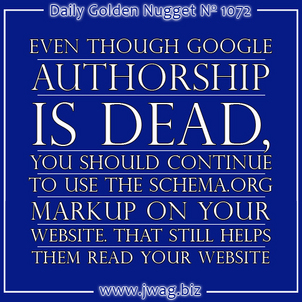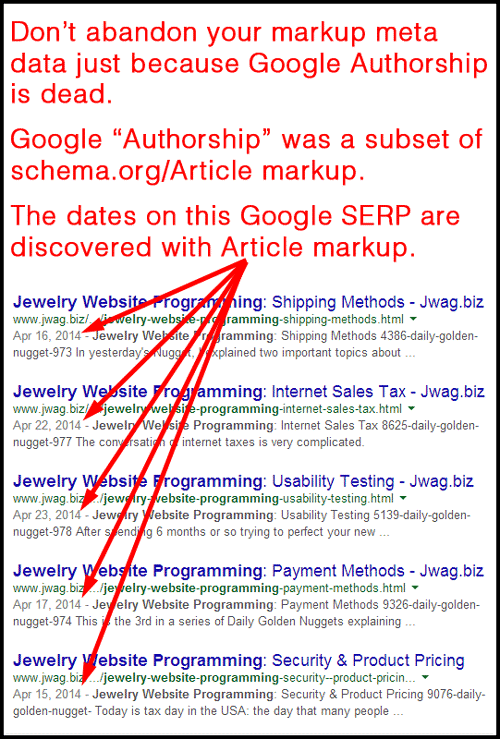
Google's done it again. Off with the author's head!
Over the past four years I have written about many online marketing topics and website procedures that are no longer valid. Social networks, review websites, and SEO techniques are forever in flux.
Facebook has changed or removed many of the features I've written about, but not nearly as many times as Google has changed since my Daily Nuggets began.
Most of the time, Google quietly changes their search algorithm features without telling anyone. But there are times when one of the Googlers drops a bombshell on the SEO world. Typical bombshells are announcements of how they will penalize people for trying to game the search system, but this time, John Mueller (a Webmaster Trends Analyst with Google) announced that they were shutting down Google Authorship for good.
This announcement shakes up the SEO world because so many of us in the SEO and website analysis industry were assuming Authorship and Google+ were very closely tied together, and a future driving force for Google.
Apparently all the testing and tracking data Google collected, showed that not enough people used it, and it didn't help people find what they were looking for. Even though they spent 3 years developing it, they eventually gave up trying to force their dream to work.
That's an important lesson for any website owner to learn from. Although Google dreams big, they are willing to change their strategy based on real data. They never fall in love with their own ideas.
Website owners should never fall in love with their own website ideas either. Even more importantly, website owners should never fall in love with, and then copy one of their competitor's sites either.
Getting back to Authorship; it was difficult to set up. First you needed a Google+ account, then you needed a bio page on your website, then you needed to have a programmer add special programming code to your website.
With millions of easy ways to do things on the internet, the highly technical things usually never get implemented unless you have the deep pockets to do it. But those technical setups usually come with several benefits that usually lead to better ranking in Google search.
Google set up this Authorship three years ago in the hope that everyone would join Google+ and set it up on their site. Using Authorship on your site helped with your ranking for a while. But the cost of the technical setup was hard to justify to website owners.
So why use Authorship in the first place?
The underlying concept of Authorship was a valuable one. It attempted to separate the paid writing services from people who were experts writing about their in their field.
Authorship was introduced during a time when Google was desperately trying to improve their search results and combat an entire industry of low paid content writers that were writing really bad content. It allowed Google to track content to its original creator. As a creator, you would have higher ranking if you created valuable content regularly.
Since Google always wants to serve us the best information from the most qualified sources, it's hard to imagine that Google would give up trying to sort out who produces low quality content vs. who is an expert.
When Google+ first launched we were all forced to use our real names. They tried to police Google+ users and deactivate accounts that broke their real name policy. Using Google+ as proof of identity, Google could tie authorship to it to confirm the ownership of the content you created and published.
Once your identity was confirmed, they would show your Google+ user photo next to your content when it appeared in SERPs. The photos were supposed to add credibility to the SERPs, but Google's research data showed that it didn't change how users clicked.
Photos do still appear in SERPs but only when showing a shared post from someone in your Google+ circles.
The Google announcement says they will not track any of the Authorship setup any more. That setup includes a bio page on your website, a link from your Google+ account, and meta data on every blog you publish.
Even though Google won't intentionally track this stuff for authorship, your bio page is still valid and the link from Google+ to your website will continue to be useful. So don't delete it.
Speaking of not deleting things; don't delete the extra programming code that you added to your site for Authorship. That code was a structured markup format explained in detail on Schema.org Specifically, they were using the "Person Markup which explains how to identify your name, and the company you work for.
What's interesting about the Person Markup, is that it is rarely used on any website by itself. The only time you would include the Person Markup is as a subset to the more important Article Markup, which is used for blogging. The Article Markup allows Google, Bing, and many other programs to quickly read a web page and identify the title of the page, the important body copy, as well as the time and date that the article was published.
Even though Google says they won't specifically track who's writing the blog any more, they are still reading all this formatted information. According to my testing, the date information is still appearing in search results as you can see here:

As a consummate tester myself, I can tell you that I didn't see much of a difference in results when Google started phasing out authorship a few months ago, although I'm always seeing shared content from people in my Google+ circles.
I realize that some people joined Google+ simply to take advantage of Authorship; in fact I always viewed Authorship as one of Google's lures to get people into Google+. The loss of Authorship doesn't mean you should give up on Google+, assuming of course you even started. This will simply clear a path for more of the stuff you share through Google+ to be seen.
Getting your Google+ posts seen was always easier than setting up Authorship. You simply need to share your stuff to Google+ just like you are doing to Facebook and Twitter. People will find and circle you if they like what you are sharing. Eventually you can build a sphere of influence that appears in SERPs even if your Authorship "byline" is missing.








